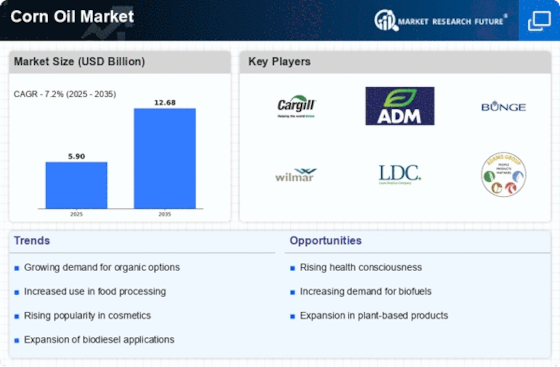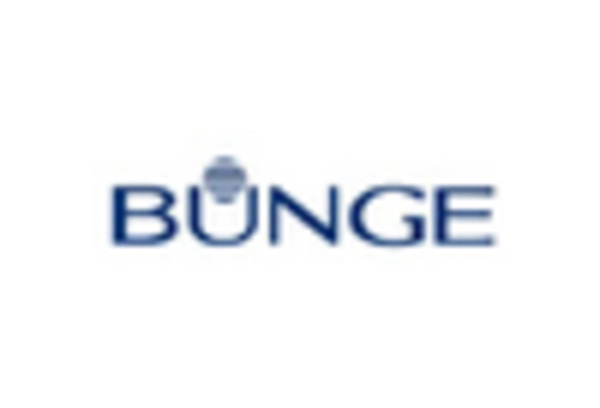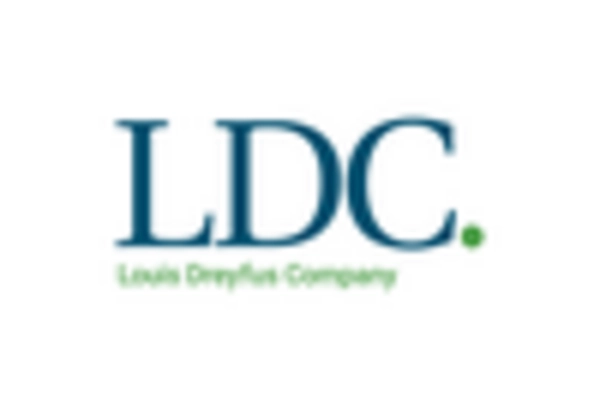Market Trends
Introduction
The Corn Oil Market is poised to experience a moment of substantial change, as a result of a confluence of factors, including technological advances, regulatory pressures, and changes in consumer behavior. In particular, new extraction and refining techniques are enhancing the efficiency and quality of corn oil production, while regulatory scrutiny of food safety and sustainability issues is prompting industry participants to adapt their practices. In addition, a growing demand for healthier and more sustainable cooking oils is reshaping market dynamics, driving companies to diversify their product offerings. These trends are critical to understand for industry players looking to take advantage of emerging opportunities.
Top Trends
-
Sustainability Initiatives
In the corn oil industry, the trend towards sustainable development is reshaping the market, with companies adopting more sustainable production methods. For example, major companies are investing in renewable energy sources to reduce their carbon footprint by as much as 30 per cent. Brands with a strong focus on sustainability are gaining in market share. The trend towards sustainable development will continue to affect companies’ strategies. In the long term, more sustainable production methods may become compulsory, which will also have an effect on their operations. -
Health-Conscious Consumer Preferences
During this period the demand for corn oil has increased, due to the growing health consciousness of consumers. Industry has responded to this trend by fortifying corn oil with omega-3 fatty acids, which are regarded as health-promoting. Sales of corn oil containing omega-3 fatty acids have risen by 15 per cent. This trend will probably lead to further innovations in product development and marketing in the years to come. -
Technological Advancements in Production
The development of extraction and refining processes has greatly improved the efficiency of corn oil production. Companies are adopting cold extraction methods that reduce waste and preserve nutrients. These innovations have increased yields by up to 20 per cent, which has had a major impact on production costs. Future developments could see the use of automation and artificial intelligence to improve both yield and quality. -
Diversification of Product Offerings
To meet the needs of consumers, companies have developed various corn oil products, including organic corn oil and non-GMO corn oil. Brands have launched a variety of corn oil products to meet the needs of different consumers, and the number of consumers in these categories has grown by 10 percent. The operational impact includes the need to expand the supply chain and the need to optimize the marketing strategy. The future trend is to compete more in the high-end category. -
Global Trade Dynamics
The corn oil market is influenced by changes in the global trade policy. The trade agreements and tariffs are affecting the supply chain. For example, new trade agreements have opened up new markets for some companies, which have increased their exports by up to twelve percent. This trend requires strategic adjustments in sourcing and distribution. Further developments are likely to involve new trade agreements that affect prices and availability. -
Increased Use in Food Processing
Corn oil is used in the manufacture of foodstuffs, particularly in the frying and baking of foods. There is a forecast of a rise of 25% in demand in the catering trade, as restaurants are looking for cheaper cooking oils. This is forcing manufacturers to improve the quality and consistency of their products. In the future, it will probably be possible to produce specialized blends, adapted to each use. -
Rising Demand for Biofuels
Interest in a renewable energy source has increased the demand for corn oil as a feedstock for biofuels. A tax incentive for the production of biofuels has led to a 30 percent increase in corn oil consumption for this purpose. This has led many companies to explore joint ventures with biofuel producers. The further integration of corn oil into the energy market will affect the way corn is grown. -
E-commerce Growth
It was the beginning of the e-business era. The Internet swept the world, and the e-business of corn oil was born. The sales of corn oil on the Internet have risen by forty percent. This trend has also forced companies to improve their e-business strategies and logistics. The competition among merchants has also become more intense, and customer loyalty will be further enhanced. -
Focus on Transparency and Labeling
It is not only the demand for transparency in food labeling that is causing companies to provide detailed information about the sourcing and production of food. According to research, 70 percent of consumers prefer products with a clear source of origin. The trend is also causing the process of labeling and the transparency of the supply chain to change. Depending on how this develops, it is possible that the government will impose stricter labeling regulations. -
Emerging Markets Expansion
Rising incomes and changing dietary habits have made emerging economies significant consumers of corn oil. The Asia-Pacific region is expected to grow by 15%, according to reports. These new consumers are pushing producers to develop products suited to local tastes and preferences. Strategic investments in these markets are likely to follow.
Conclusion: Navigating the Corn Oil Market Landscape
Competition in the Corn Oil Market is characterized by significant fragmentation. Among the leading players in the market, both the historical and new players are vying for market share. Besides, the regional trend of consumers towards sustainable products is also driving the vendors to make strategic changes in their business models. The historical players are relying on their strong distribution network and brand loyalty to capture the market, while the new players are focusing on innovation and agility to capture niche market shares. The future market will be driven by artificial intelligence, automation, and sustainable operations. Vendors need to focus on these three areas to enhance their operational efficiency, meet the demand of the consumers, and stay ahead of the competition.


















Leave a Comment